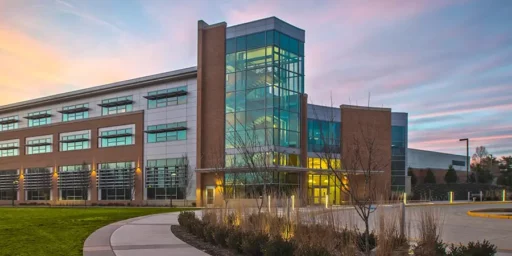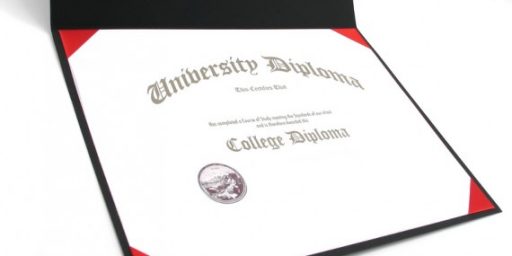College Education Economics: Is A Degree Worth It?
Apparently, some economists are arguing that we’re sending too many people to college. A piece by Jacques Steinberg for the May 14 NYT, “Plan B: Skip College,” outlines the argument.
A small but influential group of economists and educators is pushing another pathway: for some students, no college at all. It’s time, they say, to develop credible alternatives for students unlikely to be successful pursuing a higher degree, or who may not be ready to do so.
[…]
Among those calling for such alternatives are the economists Richard K. Vedder of Ohio University and Robert I. Lerman of American University, the political scientist Charles Murray, and James E. Rosenbaum, an education professor at Northwestern. They would steer some students toward intensive, short-term vocational and career training, through expanded high school programs and corporate apprenticeships.
“It is true that we need more nanosurgeons than we did 10 to 15 years ago,” said Professor Vedder, founder of the Center for College Affordability and Productivity, a research nonprofit in Washington. “But the numbers are still relatively small compared to the numbers of nurses’ aides we’re going to need. We will need hundreds of thousands of them over the next decade.” And much of their training, he added, might be feasible outside the college setting.
[…]
College degrees are simply not necessary for many jobs. Of the 30 jobs projected to grow at the fastest rate over the next decade in the United States, only seven typically require a bachelor’s degree, according to the Bureau of Labor Statistics. Among the top 10 growing job categories, two require college degrees: accounting (a bachelor’s) and postsecondary teachers (a doctorate). But this growth is expected to be dwarfed by the need for registered nurses, home health aides, customer service representatives and store clerks. None of those jobs require a bachelor’s degree.
So far, so good.
However, David Leonardt, in a piece for the NYT Economix blog titled “The Value of College,” counters with this chart:
Relative to everyone else, college graduates have never done better than they are doing right now. In absolute terms, of course, they too have been hurt by the deep recession that began in late 2007. But they have suffered much less, on average, than workers with less education. They have been less likely to lose their jobs, and their paychecks have survived the downturn much better.
It’s theoretically conceivable that these trends have nothing to do with the actual education that college students receive. Perhaps graduates gain little or nothing from college that they didn’t already know — but the economy has been changing in ways that favor the kinds of people who enroll in college and make it through. In that case, the charts above would say nothing about the college.
But the Atlantic‘s Daniel Indiviglio retorts, in “Should More People Skip College?” a piece touted by his colleague, Andrew Sullivan:
But what does this chart actually show? Not that a college degree was necessary — just that employers prefer them. The value of a degree has become something of a self-fulfilling prophecy: it’s become worth so much because people assume it should be.
Let’s do a quick thought experiment. In the example above, it’s not unrealistic to assume at least 10% of the jobs of “college graduates” didn’t actually need the degree for the skills their job requires. Imagine if those 10% of individuals hadn’t gone to college. There would still have been demand for the jobs that they took, so who would have got them? Easy — people without college degrees, possibly even the same ones. Just because college graduates earn more doesn’t mean that their degree provides them any additional knowledge necessary to succeed in their jobs; it just means that employers found them more attractive because of the degree.
These days, four-year colleges have all sorts of majors that didn’t used to be necessary for jobs. For example, at some colleges, you can major in “criminal justice” and get a job as a police officer after graduating, even though being a cop didn’t traditionally require a degree.
Well . . . yeah. But that’s like saying that, in the absence of skilled workers, employers will settle for unskilled workers. Why, if fewer people went to medical school, we might have to let nurses and physician assistants perform more services. And, come to think of it, people used to perform surgery without a couple decades of schooling!
But, in some instances, the jobs have gotten more complicated as knowledge has accumulated. In other cases — like cops for instance — we’d simply rather have bright, educated people filling the slots.
Is college, in many cases, a signaling mechanism rather than a certifier of job-related skills? Sure. But employers apparently have decided that the signaling mechanism works — otherwise, why would they continue to pay college grads more?







If Steinberg’s talking about a new path for people “unlikely to be successful pursuing a higher degree”, why is Leonardt countering with statistics about college graduates?
Leonardt’s graph seems to show that people with “some college”, presumably the bulk of the people we’re discussing, are doing about as well surviving the recession as people with a high school diploma. And they’re racking up (in some cases) huge bills along the way. Maybe Steinberg’s on to something.
Maybe it has nothing to do with it being a rational decision. Maybe it’s just a matter of “because we’ve always done it that way, and everyone else does, too.”
Relative to everyone else, college graduates have never done better than they are doing right now.
Leonhardt’s counter-claim is misleading, in that over time the composition of the educational categories has changed. Multiple factors are exerting influence on the rise of the salaries of college graduates, here are a few:
1.) The cognitive ranking, or class ranking, of students who go on to graduate college, take some college, finish schooling with high school and do not finish high school, has shifted downwards over time;
2.) The gains to education are not proportional within each class and the gains that Leonhardt’s graph shows is the aggregate gain for each category. We’ve seen that there is a steeper curve to gains to cognitive ability than to gains to education, yet this graph is comingling these two variables. Some college graduates are going to reap tremendous gains while others won’t and the key determinant will likely be unmeasured general cognitive ability rather than course of study or choice of institution.
This doesn’t even seem to get to the nub of a more practical problem facing young parents. Has anybody seen a line graph showing the projected increase in the cost of a college education over the next 20 years. Unsustainable, you’d think?
This doesn’t even seem to get to the nub of a more practical problem facing young parents. Has anybody seen a line graph showing the projected increase in the cost of a college education over the next 20 years. Unsustainable, you’d think?
Something’s got to give. I think it will have to be the utility of a college degree as a signaling device. Some alternative means of assessing employment candidate qualities will have to gain traction even if it results in disparate impact.
It strikes me that this question might be answered differently in aggregate and in the specific. A generic kid might be better off going to college, but someone who specifically wants a career with a viable non-college path might not.
In another specific, someone who pursues a wrongheaded degree might be better off changing majors rather than abandoning college.
I find it extremely difficult to make heads or tails out of the various charts and tables of median earning for college grads because they invariably do not include enough information. They typically include the median but don’t tell us the standard deviation. Most include all college grads, aggregating those with two year degrees, those with four year degrees, and those who’ve gone on to professional degrees.
According to the Department of Education there are something between 1 and 1.5 million graduates of four year bachelors programs every year. It’s a lot harder to ferret that statistic out than it should be. Why? It would seem to be a simple question.
Of those roughly 1% go on to become medical doctors. Another 10% go on for MBAs. Salary expectations for those fields alone are so much higher than the median income they must skew the aggregated figures. Interestingly, both fields also appear to display a “long tail”, i.e. there a small number of very high earners who skew the aggregate figures.
So, basically, my conclusion is that you can’t get jack out of these figures.
We must also look at the college degree as a hiring filter. The IBM of the human resources world, i.e., nobody ever got fired for buying IBM. Faced with a stack of applications, human resource types seek someway to sort the candidates. One is by education even if that education isn’t vital or applicable to the job. But in the competition, especially for today’s office jobs, hiring the holder of a bachelor over the associate degree over the non-graduate is the safe play for the hiring manager. Not to mention the organizational prestige that drives things like requiring cops to have a college degree these days.
In addition, there is competition for promotion, you might be able to be a cop without a degree but good luck getting promoted when competing with all those who have a degree in anything. Same for the Armed Services, senior rank is possible for the elite performers with the required undergraduate but the center of the bell curve needs a masters to pass the first filter of a promotion board.